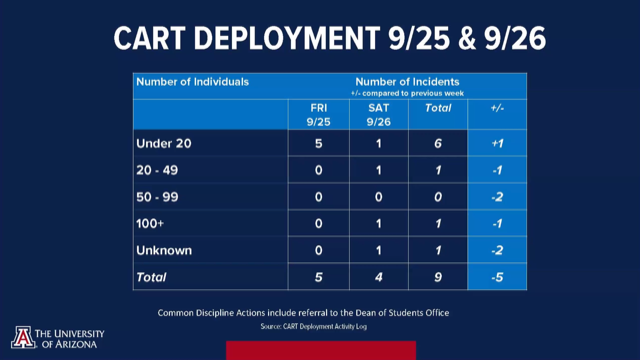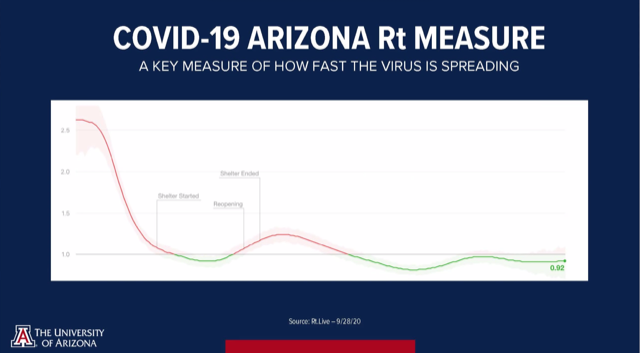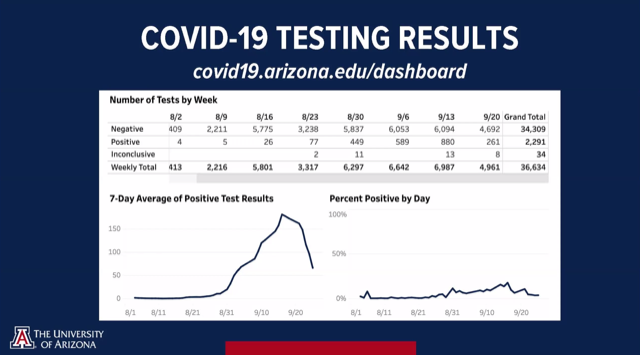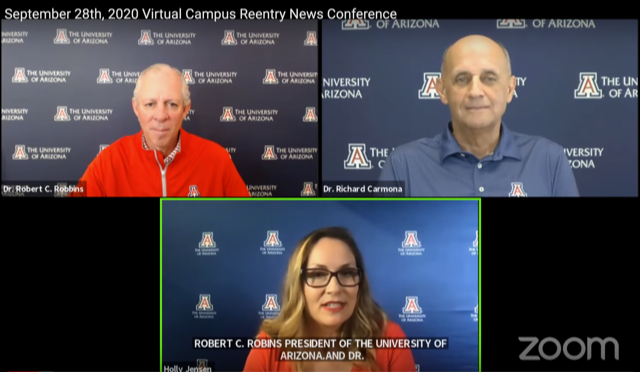The University of Arizona’s Reentry Task Force met Sept. 28 to discuss optimism surrounding low COVID-19 transmission and a decrease in cases, as well as the end of the 14-day shelter-in-place.
The university will remain in Phase 1 of reentry, with in-person classes being held for essential courses only.
On the most recent testing day, Sept. 25, there were 36 new cases from 1,051 tests conducted, which is a 3.4% positivity rate. Out of 89 students tested with Campus Health, 17 positive cases were discovered. If you or someone you know shows symptoms of COVID-19, contact Campus Health.
President Dr. Robert C. Robbins noted there is still plenty of vacancy in the isolation dorms, with 252 beds occupied and 348 beds available. Currently, 43 students previously residing on campus are now isolating off-campus.
Robbins was happy to report that he’s seeing more compliance among students. Calls to neighborhood hotlines regarding COVID-19 noncompliance and “CART deployments” to noncompliant properties (that hold large gatherings without proper public health precautions) have decreased. Still, Robbins warned that the fight is far from over.

“This is not a time to become complacent, however; I continue to see groups of students, around University Boulevard especially, without face coverings,” Robbins said.
The two-week shelter-in-place came to an end at the end of Monday. The task force believes the shelter-in-place had a significant impact on reducing transmission. However, if case numbers rise, they will reinstate the initiative.

Testing will continue to remain available for all asymptomatic students, faculty and staff. The university has the capacity to process 1,600 antigen tests a day and 1,700 PCR specimens a day. In addition, the university will continue the wastewater-based epidemiology program.
“Physical distancing and other measures will continue to be the hallmark of our success,” Robbins said. “I encourage all of you —students, faculty, staff and other members of our southern Arizona community, including visitors to our campus — to continue to follow the rules so we can protect one another and move forward. We cannot control the virus on our own. Please do your part.”
Task Force Director Dr. Richard Carmona expressed a cautious optimism similar to Robbins.
“In general, what this shows is that the numbers are still down, but not down enough,” Carmona said. “We have to, you know, bear down, mask up, continually. We can’t be complacent. The president and I have reinforced this every single week here and even though the numbers are concerning, they’re still staying relatively low, but we cannot be complacent.”
In terms of the number of positive cases per week, the week of Sept. 20 saw the lowest number of positives since the week of Aug. 23. A total of 261 positive cases were identified the week of Sept. 20, compared to 880 cases the week of Sept. 13.

“I am not going to say I’m happy with that,” Carmona said. “But we still have a lot more work to do to really flatten that curve and keep it flat for a couple of weeks, which will really tell us the transmission is down significantly.”
Robbins acknowledged that members of the Wildcat community are eager to open up and begin the return to in-person classes.
“I do hear from student leaders, [in the] hundreds of students I interact with during the week that, you know, ‘We signed up for in-person classes and we would like to be able to do that.’ And I think there are many faculty members who are also saying, ‘Look, we see that there are mitigation efforts. Can we slowly move back into more face-to-face interactions?’” Robbins said. “I think it will be good for the mental health of the students to be able to do that and not feel so isolated.”
Robbins also told the Daily Wildcat the university will be conducting mandatory periodic testing for students residing on campus within the following weeks. Asymptomatic students (living on or off-campus), faculty and staff can get tested from Monday to Friday at the NorthREC.
Follow Kristijan Barnjak on Twitter









